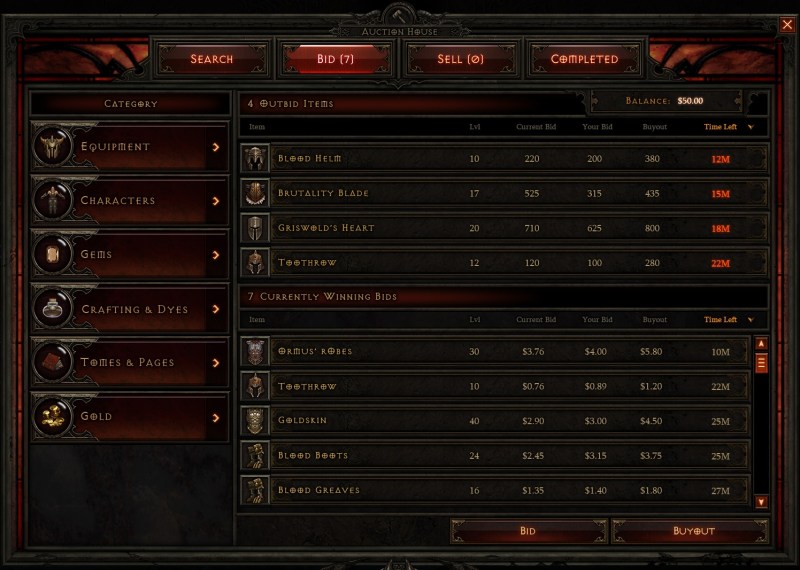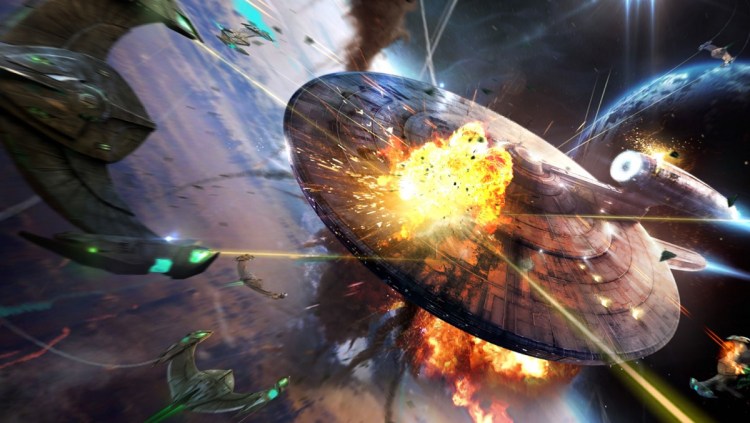
Above: Nelson Rodriguez is head of media strategy at Akamai.
GamesBeat: Are we getting far beyond the five percent of the players that are going to pay for something?
Linden: I think so. Again, I think that’s the experiment right now. I don’t think anybody fully knows that. Does it increase by one percent jumping into the economy? Do we get 20 percent jumping in versus a traditional free-to-play economy? If anything it creates engagement. We’re never supposed to use gambling references, but I think I’m going to use one anyway. I feel like the game industry is kind of like roulette now. It’s the player against the house, and frankly the house is going to win. They’re buying an intangible asset.
But what can happen is we slowly shift it to poker, where players play against players and we take a rake off that. It’s not like it will be a hard transition and every game will do that, but there’s value in it. It becomes more fulfilling for players over time as we start offering those mechanics, where players are in on it. They’re in on those purchases.
Nelson Rodriguez: As you’re talking about these thoughtful economic models and topics of rarity and secondary markets, I think the whole time about crime. Not just because I’m from New York, but because the way that Akamai thinks about this–the whole reason we have this breakfast is so we can learn about what’s driving you. We see so much manipulation in these economies, and we see it in the real world. Sneaker companies that work with us, they have bots that are buying up all the sneakers in the first five minutes. It happens in games. People are building automation tools. If you have grinding as a mechanic–if you have an elaborate economy with high-value items and a secondary market and grinding, then all you have to do is build automation for the grind. That’s one way to manipulate the economy. It may not ruin it, but for some companies it’s become a huge issue.
June 5th: The AI Audit in NYC
Join us next week in NYC to engage with top executive leaders, delving into strategies for auditing AI models to ensure fairness, optimal performance, and ethical compliance across diverse organizations. Secure your attendance for this exclusive invite-only event.
Linden: What was also interesting is if it’s time-based and you don’t disclose the rarity until after the time is ended, you kind of eliminate those bots. If you have somebody coming in and saying, “We think this will be the most valuable asset,” and they buy an extra thousand of them, it just increases supply. They don’t have the ability to come in and buy the most valuable items and sit on them.
There’s some stuff you can do to combat it. I think it’s going to help with some of those transactions. But I agree. The whole AML/KYC kind of thing is very real. The other thing you have to be careful of in this type of world–if you sell a loot box and the player can buy a loot box and sell whatever comes out of it, that’s gambling. It is gambling in almost every country in the world. If you go down that path, you have to think about things like skill-based. Maybe you have to level up a certain degree or play with it a certain amount of time before you can sell it.
In our case, what we’re doing with our first game is there are no loot boxes. You see what you’re buying. You see the attachments. There’s just a lot of variety and lot of content coming into the game. The content doesn’t have to come from us. It can come from partners. It sounds like UGC, but it can come from a lot of different permutations of that.

Above: John Linden, CEO of Mythical Games.
Rodriguez: But if grinding is allowed in the game, the grind is one way in for automation to take advantage of the economy.
Linden: If you issue real currency against that, yeah. We’re not going to give out virtual currency for the grind. Maybe we’ll give out assets. You shift in that direction. But you have to take that into account, for sure.
Tucker: Most games have a grind path for content, most free-to-play games. I think one thing we’ll start to see more of in the future is a separation of value. What we’ll define is if the grind path might give exclusive value, whereas the paid path provides a more efficient route. Or a vanity route. Then what we have is an exchange platform that allows people to invest time to acquire goods that are transacted against an aftermarket. That’s another place where I could see the tokenization of content being relevant.
Linden: You have to think through that in the design. One thing we struggled with in the first game is we can’t give out a bunch of value when you first start the game. We’re playing in this world of vinyl toys. We’re creating that scuffed, rough, not-for-resale type version. That first one you can’t resell, because otherwise you could automate that in 15 minutes, probably. Hey, I got 12,000 accounts. I transfer that on the back end to one account and look what I have. You have to design against that.
Again, I don’t think there’s anything that’s foolproof. All these new game economies are literally a palette of tools. We have new brushes to paint with. Hopefully the new tech makes it easier.
Rodriguez: The thing that’s odd to me about it, as this discussion highlights, gaming is now this giant unregulated currency market. It’s probably the world’s largest unregulated currency market. But we’re not necessarily managing it that way. We’re not thinking about it that way, because each game has its own currency and economy. It’s not necessarily fungible. But once you can translate it into real value through secondary markets, then it’s a currency market. We’re not managing it that way.
GamesBeat: Facebook has something to say about that. [big laughs] But it is interesting that–we’ve been talking a lot about mobile games. What is your platform?
Linden: We’re going PC/console first and then bringing it to mobile later. There’s a challenge with secondary markets in mobile right now.
GamesBeat: There’s a lot of discussion around game economies across games. That’s a level where Facebook would be operating, with a currency that goes across a bunch of games and a bunch of different rewards that could happen.
Audience: One area we’re looking at, and something I hear a lot about from different publishers–there’s the concept of the gamer adapting. You play on multiple platforms. You play with multiple titles. You have multiple identities. Those are very powerful. You cherish them as a gamer. But if you go to a platform that’s entirely predicated on your real identity, that allows for some good things. It’s easier to defeat fraud and things like that.
We’re playing a lot with that concept. Is there a way to somewhat unify this? You keep the gamer identity that’s very specific to a game or a publisher, but at the same time, behind the scenes, there is a way to equate that, so that I have my PSN identity, and then I have a mobile game identity, but somehow those are equated and there’s an easier way to track all that.
Maybe further down the line that can become an easier way to do things from a currency perspective. But we’re thinking a bit more in terms of the gamer identity. Who do you want to be as a gamer? Would it be easier for you to equate all these identities you have in a way that’s not threatening, but relies on the real identity? That’s something that we and some publishers will start playing with. They’re interested.

Above: Diablo III auction house
Rodriguez: I’m curious to hear from publishers about your interest in a unified currency. I’m sure you’ve dabbled in it on different platforms. Do you prefer to manage your own economy versus working through a partner?
Linden: When you talk about a universal currency, is that across publishers, or within a publisher?
Rodriguez: Even within a publisher, managing it yourself versus using Facebook or Xbox or PSN.
Linden: 30 percent is pretty high versus being independent. [laughter] There’s a lot you can do for 30 percent. But I think it’s a necessity still. You have to go through them. That’s where the ecosystems are right now. It’s great seeing things like Epic and those guys challenge it. ByteDance is starting to jump into having the ad network stuff. It’s great seeing these new networks pop up, which gives you better distribution around the world. That’s cool. But it’s still a walled garden, and it’ll continue to be for quite a while.
GamesBeat: [Former Blizzard attendee], did you have any observation about this?
Audience: The first thing is what’s right for the game, the game community, the players. When we’ve created game economies, it’s about what’s the most fun. When I think about ways to monetize players, I always use a sports enthusiast model. That’s one of the best examples of secondary monetization. If you’re a big sports fan, you buy gear. You buy all this memorabilia. You can basically be a whale in sports memorabilia, but you’re happy about that. You’re showing enthusiasm. I take the approach of, how do we monetize players in a way that they’re showing enthusiasm and passion for the game, and they’re excited about their purchases?
Is there a sports memorabilia currency market, though? The secondary market, I feel like most games fall into that category.
Rodriguez: The reason I see gaming as unique is that in some ways it’s more fungible. Some of those assets are more fungible than a hat. Theoretically a hat is fungible. But the fact that you can unlock, through grinding, value, which is a lot harder to do if you walk into a sporting goods store. You can unlock value through non-human methods. To me that’s what makes it different. Theoretically anything can be–chocolate bonbons can be a currency market. But the fungibility, and the fact that currency can be created through running a script, is what makes it different.
Audience: Transactions at scale lead in that direction. When you can go to eBay and sell 10,000 items tomorrow.

